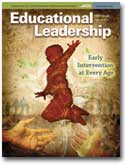My 14-year-old son, Garrett, has always been an exceptional child. When he was a preschooler, he could look at a picture of a complex Lego construction and then put it together without assistance. His artistic abilities and his skills on the computer are remarkable. Even though he possesses all of these special talents as well as amazing social skills, Garrett has struggled with one area for his entire life—academics.
When Garrett started prekindergarten, he was a typical 4-year-old who loved Winnie the Pooh and cuddling. However, at the end of the school year, Garrett's teacher told us that Garrett was a bit immature for his age and that he might eventually have to repeat kindergarten.
Thanks to the prekindergarten teacher's comment, we weren't surprised when Garrett's kindergarten teacher recommended that he stay back. We agreed to the recommendation, thinking that, because maturity issues seemed to be his main problem, he would soar through his second year. Unfortunately, he struggled academically. At the end of the year, he was still unable to name most letters or associate them with their sounds. He would forget the names of numbers, calling 7 “the number between 6 and 8.” On the other hand, he was flourishing socially, and he could accurately retell in his own words a story that was read to him only once.
Intervention Attempts
Late in his 1st grade year, Garrett was put on the list to be tested for a learning disability. By the middle of 2nd grade, he had been diagnosed with a language processing disorder and placed in the exceptional education program. Although he was pulled from his regular classroom every day for about 30 minutes to receive extra support, Garrett still could not read by the end of 2nd grade.
In 3rd grade, Garrett continued the pull-out classes and also began receiving intensive small-group reading instruction using a 1st grade phonics-based program. By the end of 3rd grade, Garrett was reading on an early 1st grade level. However, this small amount of progress was not enough to enable Garrett to pass the standardized test that Florida required for moving up to 4th grade.
Progress Halted
We hoped that Garrett would continue to make progress in his second year of 3rd grade and further close the gap between his instructional level and his actual grade level. Despite our hopes, Garrett went through that second year of 3rd grade, then 4th grade, and then 5th grade without making much progress. By 5th grade, he was receiving three doses of reading instruction every day plus extra help at home. Nothing was working. In August 2006, Garrett had been in school for nine years, receiving intensive reading interventions for five of those years, yet he was only able to read on a 1st grade level.
When Garrett was in 6th grade, I met with his reading teacher and the school's reading specialist to discuss how we could help him. I had been to many of these meetings, and they all went the same way. The teachers would smile sadly, tell me my son was not making progress, and suggest activities to use at home. Being an early childhood teacher myself, I knew the tricks of the trade and had been doing them for five years to no avail.
As I expected, the reading specialist explained the outcome of the assessments that she conducted with Garrett and gave me suggestions. She said that we should focus on helping Garrett master the basics so that he could at least be “functional” as an adult. I wasn't willing to settle for my brilliant son being just functionally literate. I wasn't ready to give up on him, but I didn't know what to do next.
During this meeting, we were discussing Garrett's artistic abilities and his keen interest in computers when his teacher asked me if Garrett had ever been to a developmental optometrist. He had been to our family optometrist and wore glasses, but I had never even heard of a developmental optometrist. Garrett's teacher told me that another of her students had been to a developmental optometrist and was currently using a computer program that seemed to be helping him.
At Long Last—Hope
To be honest, I thought visiting the developmental optometrist would be just another dead end. I only pursued it because Garrett's teacher thought the computer work could take the place of his reading log homework, which was torture to get Garrett to complete each night.
On October 31, 2006, Garrett went in for a comprehensive visual perceptual exam. On this day, I realized how much of a beating my son's self-esteem had taken over the years. While in the doctor's waiting room, I showed Garrett a brochure that said, “Why Bright Children Struggle in Reading.” I told him, “Look, Garrett, that's like you.” And he quietly responded, “Yeah, only I'm not bright.” After our visit with the doctor, which gave us the first clue that Garrett's reading difficulties were visually based and fixable, Garrett asked me why I was so happy. I asked him if he knew what all this could mean. His response was, “Yeah, it just means that something else is wrong with me.” My heart broke, and I was more determined than ever to see my son succeed.
Garrett returned to the optometrist on three separate occasions for additional exams. In December 2006, we went in to discuss the results of these assessments. Garrett was diagnosed withconvergence insufficiency, an eye muscle condition in which the eyes do not look at near objects easily and have a strong propensity to drift outward when reading or doing close work. He was also diagnosed with oculomotor dysfunction, a moderately common eye problem that makes it difficult to follow moving objects accurately or quickly shift the eyes from one point to another, which is necessary for tracking while reading or copying. (See the Web sites listed below for more information on these and similar disorders.)
On January 2, 2007, Garrett began an at-home computer-based vision therapy regimen. He would complete two 20-minute therapy sessions a day, seven days a week, for the first month; then shift to once a day; and gradually, to once every other day, during the next three to four months. After the first two weeks of therapy, Garrett's independent reading level had jumped to late 2nd grade and his instructional level to early 3rd grade! His fluency, although still below grade level, had also jumped from 28 words per minute to 53 words per minute. After only eight weeks, Garrett's independent reading level had climbed to 4th grade and his instructional reading level to 5th grade.
Unnecessary Suffering
Many children struggle needlessly because the usual interventions treat just the symptoms and not the cause of their academic difficulties. My son went through more than eight years of thinking he was stupid when we just didn't have the information we needed to get him help. Had more of his teachers known about convergence insufficiency, someone might have suggested visiting a developmental optometrist much sooner. And if the school district provided vision therapy, just as it provides speech therapy and occupational therapy, even children whose parents cannot afford the treatment could get the help they need.
I wonder how many children will go through what my son has gone through because no one has looked for the reasons behind their struggles. If schools could do more to identify these underlying causes as early as possible, more children could experience the success Garrett now enjoys without spending years falling further and further behind.
When Garrett was in 3rd grade, he brought home a library book that I knew was much too difficult for him. I asked him why he had that book instead of one he could read. His response was, “Mommy, the other kids don't know I can't read this one, so I just pretend to read it during silent reading time.” Garrett doesn't have to pretend anymore. No child ever should.


